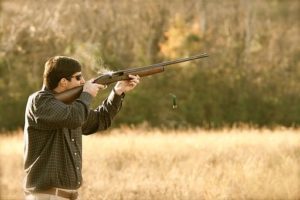
A controversial drone bill is being considered in the Oklahoma Senate, with local advocates crying foul at media headlines that describe the bill as a “shoot down” bill while the drone industry worries that’s exactly the effect the law would have.
The Senate version of Bill SB660 states:
Any person owning or controlling real estate or other premises who voluntarily damages or destroys a drone located on the real estate or premises or within the airspace of the real estate or premises not otherwise regulated by the Federal Aviation Administration or where a reasonable expectation of privacy exists,
shall, together with any successors in interest, if any, not be civilly liable for causing the damage or destruction to the property of such person.
While one member of a Facebook discussion group on drone law complained that the characterization of the proposal as a “shoot down” bill was unfair, drone operators fear that it will be interpreted that way: with guns being the most likely means of damaging or destroying a drone flown over private property. “While this isn’t a ‘shoot down’ bill, it’s very likely that it will become one if passed,” says Vic Moss, an award-winning commercial drone operator and active administrator of the UAV Legal News and Discussion Group, which boasts over 8,000 members.
Moss points out that the bill relies upon two specific phrases that are open to challenge. “First, it talks about airspace ‘not otherwise regulated by the Federal Aviation Administration.’ The FAA regulates from the ground up… People fail to understand the difference between ownership of airspace, which varies from locale to locale, to regulation of airspace which is 100% under the purview of the FAA,” says Moss.
The second issue relates to the “reasonable expectation of privacy,” which Moss points out has been the subject of multiple supreme court rulings establishing that the airspace is public.
“My fear is that if this passed, it will become open season on drones in Oklahoma,” says Moss. “Most people do not understand either the definition of the NAS, or SCOTUS ruling on privacy.”
The bill has other negative associations. Originally authored by Oklahoma Republican Senator Ralph Shortey, recently arrested for soliciting sex from a 17-year old boy, the bill was characterized in a Washington Post article as an example of Shortey’s more “eccentric” ideas – along with his so-called “fetus bill,” a bill that he said would prevent embryonic stem cells from being used to develop artificial flavoring, an idea he got from what he described as “internet research.” On March 15, Senator Shortey was removed as author and replaced by Senator Fields.

Miriam McNabb is the Editor-in-Chief of DRONELIFE and CEO of JobForDrones, a professional drone services marketplace, and a fascinated observer of the emerging drone industry and the regulatory environment for drones. Miriam has penned over 3,000 articles focused on the commercial drone space and is an international speaker and recognized figure in the industry. Miriam has a degree from the University of Chicago and over 20 years of experience in high tech sales and marketing for new technologies.
For drone industry consulting or writing, Email Miriam.
TWITTER:@spaldingbarker
Subscribe to DroneLife here.







[…] – From DroneLife […]